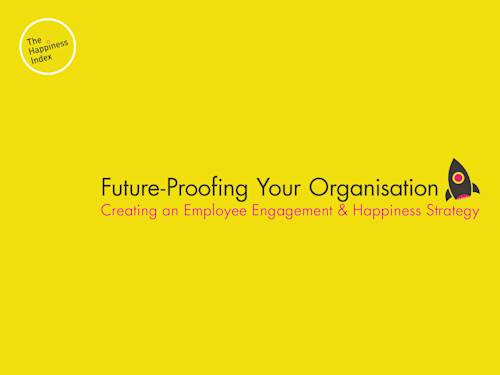
Creating an Employee Engagement AND Happiness Strategy
We speak to HR professionals and leaders every day, so we know that mental health is an important part of many organisations’ wellbeing plans. At The Happiness Index, we’re really proud of the work we’re doing to support our people’s mental health in the workplace. Read on to find out more. We’re hoping to inspire you to add some of these into your company roadmap. Let’s dive in…
Ever since the pandemic we have seen the lasting impact of mental health issues envelop our nation. Study after study after study has shown the effect that the pandemic has had and continues to have on mental health, with reports suggesting a long-term psychological impact among high risk groups as we near the middle of 2024.
The reality is that this is going to have an impact on every facet of our lives. Since we spend nearly a third of our time at work, that includes the workplace.
At The Happiness Index (THI), we’re committed to supporting our people’s mental health. Having poor mental health is normal, and increasingly so. Part of our vision of #FreedomToBeHuman is to embrace the realities of being human, even if they’re uncomfortable.
We thought we’d share 10 things we’re doing to support mental health and wellbeing in our workplace. As we’re remote first, lots of these suggestions work whether you’re back to the office full time, completely remote, or working a hybrid solution. It might inspire you to introduce similar programmes in your organisation, or perhaps you’ll want to join our team…
At THI we’re lucky enough to have a truly inspiring leadership team who really lead from the front. They feel free to share their own struggles with mental health, whether that be a bad day, or a more serious diagnosis. This means that our whole team knows that their mental health will be taken seriously.
As part of this commitment, one of our co-founders, Chris, has completed mental health first aid training to better support our team. More on this later!
By breaking taboos, everyone in your organisation will feel more able to share how they’re feeling.
We have a yearly wellbeing day. Giving people time out during the working week to support their mental health in ways that suit them is a great tool to help your people help themselves. Our people team even makes little care packages with self-care ideas and treats.
Many companies are finding these days as helpful as we do, and they’re becoming more common and frequent. Whether you choose to have a wellbeing day once a quarter or once a year, this is a great benefit for your people.
Anyone at THI who would like access to a mindfulness app can get a subscription, on us. Many of our people use and love Headspace, but we give people the flexibility to pick something that works for them. We really encourage you to pick an app that’s local to you, or which is available in your language. Speak to your team to find out what they would prefer.
There are lots of alternatives available if your people don’t love apps. We run Morning Mindfulness sessions led by one of our team. You could look into live mindfulness classes, books, or sharing resources like colouring books or mindfulness prompts as other options.
Not only do we offer our team flexible hours, meaning they can start and finish at a time that suits them and their lifestyle, we also encourage full flexibility. This means that if someone needs to take some time out for themselves in the middle of the day, they can make up the time whenever it suits them, no questions asked.
This can be useful to different people in different ways. Some people find they need a break for a walk outside of typical lunch hours. Maybe someone needs to go to an appointment to support their mental health. Or maybe they want to go pick up their kids from school without feeling guilty. Full flexibility means that everyone can take care of themselves on their schedule.
Sometimes self-care and mindfulness won’t cut it. Mental health is very serious, so we make sure we have serious support for our people. We help our team access professional help if they need it.
We use a care coins scheme which means that our people can access specialist therapy when they need to. Because a range of therapists are available, it can be completely tailored to their needs. Plus, we can share mental health support with those closest to us if that’s going to be the most beneficial to us. There are many ways to support your people with professional help, so this is something that we recommend.
We have team members across our company who have completed the incredible two-day mental health first aid training. Everyone who has been on the course has found they have been able to utilise the content both personally and to support others.
Not only did it help our people to support each other, but it also showcases a tangible, monetary commitment to our team’s mental health. Actions speak louder than words.
In line with the previous point, our entire team was encouraged to attend a one-hour mental health training course which covered tips, tricks and terminology around mental health. This really helped us to consider what we could do to support our own mental health as well as that of others.
By having this training available to everyone, we were able to show company-wide commitment. Plus, the facilitator was able to encourage open conversations about mental health, helping to break down taboos.
We recognise that mental and physical health are often interconnected and co-dependent. People’s bodies and minds aren’t separate - Health is holistic and ill health accounts for the physical and mental. Therefore, we rebranded our sickness leave and corresponding policy as ‘health and wellbeing leave’ rather than ‘sick leave’ as it is more conventionally known. We did this in order to give people permission to take time off when they're struggling with their mental health.
Being unwell is part of being human. Part of having the Freedom to be Human is feeling safe to be absent from work when you need time and space to prioritise your health and wellbeing.
One of the most worrying things about mental health is that it often goes undiscussed. This is particularly true in the workplace. We run our mental health survey during and after times of unsettlement to help us understand our people’s specific needs around their mental health.
The questions, designed by a panel of mental health and neuroscience experts, have helped us uncover how to best support our people’s mental wellbeing needs as well as showing our people that mental health is something we prioritise. Learn more about wider wellbeing surveying here.
Finally, we know that work worries don’t always strike on schedule. That’s why it’s important to us that our people can provide anonymous feedback in real-time when they’re struggling. Our Employee Voice Survey enables us to listen to our team whenever and wherever they need us.
Sometimes our people provide actionable constructive feedback, and sometimes they just tell us they’ve had a tough day. Either way, we need to be able to hear them out and provide solutions where possible.

Linked to Happiness in our neuroscience methodology... learn more
The Happiness Index helps organisations measure the key employee engagement AND happiness drivers to power their people strategy.
Our unique platform offers the products, insights and tools to shine a light on your cultural health and empower management to drive thriving cultures.
Our neuroscience-based pre-built surveys measure the full employee experience - from onboarding to exit to empower and enable organisations to understand their people and create data-led action plans.
